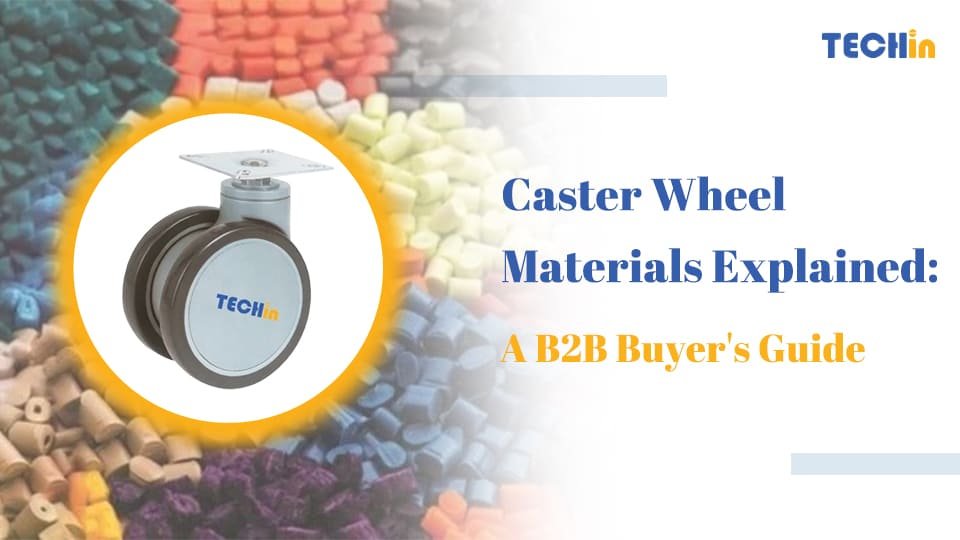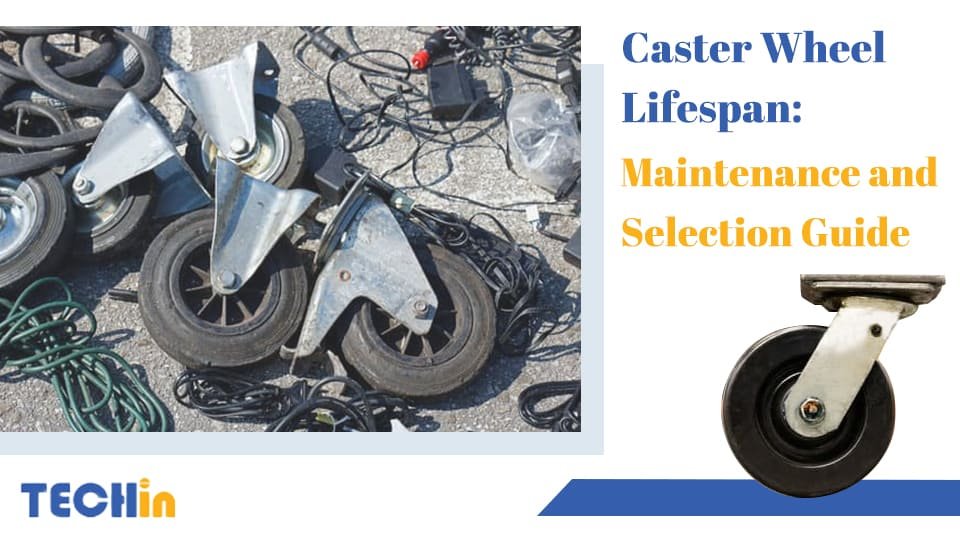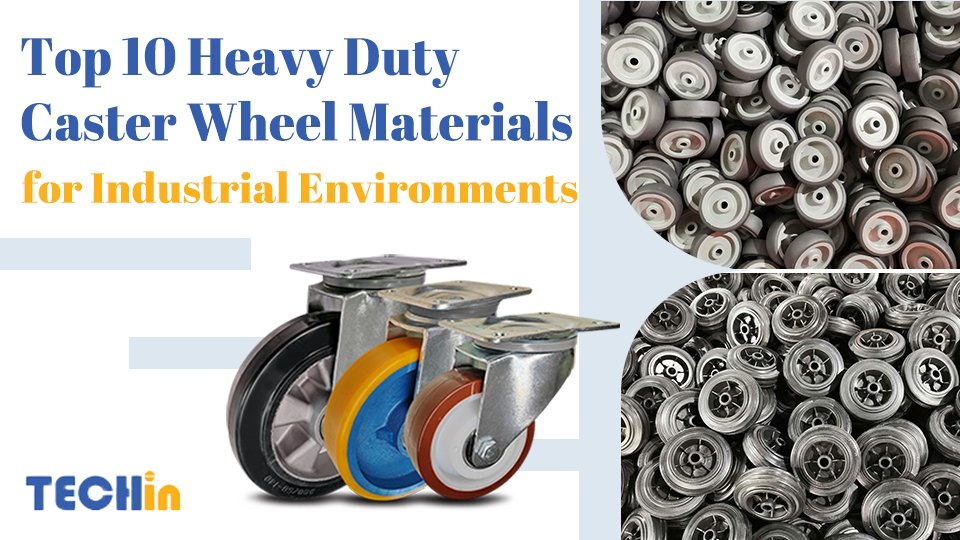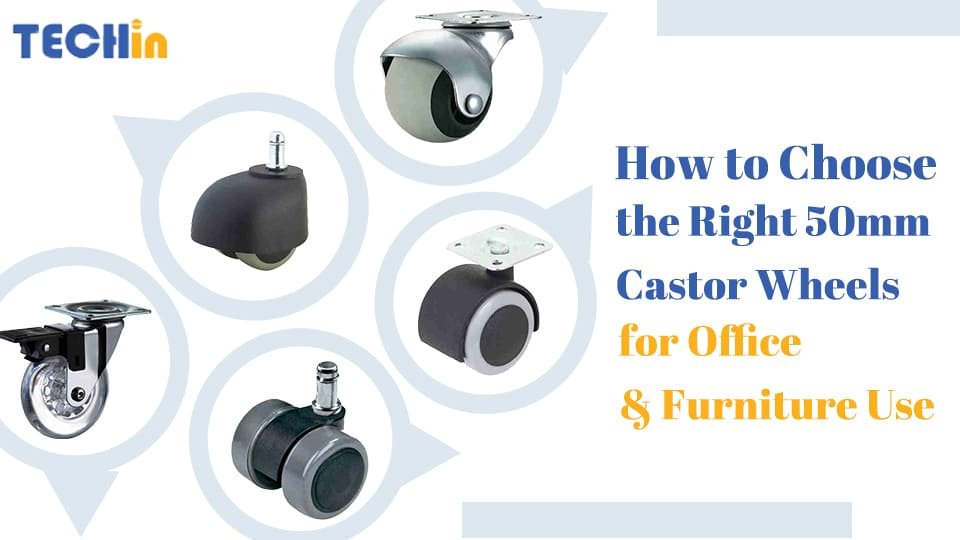Finding the right caster wheels for your shopping carts is important for smooth operation, long life, and happy customers. Cheap wheels will mean more repairs and unhappy customers, which will affect your customers’ shopping experience and your store’s reputation.
Most retail shopping carts use a 5-inch diameter wheel with a polyurethane (Poly) tread as the standard. TPE wheels have a slightly softer rubber-like tread. There are also specialized wheels like Compound, Anti-Static, and Friction wheels for specific needs.
Choosing the right caster wheels is important for your carts to work well and last a long time.
What Are the Wheels of a Shopping Cart Made Of?
Shopping cart wheels are made from tough materials that can take a beating and carry heavy loads. The most common material is polyurethane (Poly). It’s tough and rolls smoothly on different surfaces. TPE (Thermoplastic Elastomer) wheels are also popular because they have a softer, rubber-like feel. They’re quieter and give a smoother ride.
Some wheels are made with special compounds for specific needs. For example, anti-static wheels prevent the buildup of static electricity. This is important in places where there are electronics. Friction wheels give you extra grip. They help keep your cart stable on slippery surfaces.
Table 1: Common Materials for Shopping Cart Wheels
| Material | Characteristics |
|---|---|
| Polyurethane (Poly) | Durable, smooth operation, resistant to wear and tear |
| Thermoplastic Elastomer (TPE) | Softer, rubber-like texture, quieter and more cushioned ride |
| Anti-Static Compound | Prevents static electricity buildup, essential in electronic environments |
| Friction Compound | Provides extra grip, stability on slippery surfaces |
What Are the Advantages of Polyurethane Tread Wheels?
Polyurethane tread wheels offer several advantages, making them a popular choice for shopping carts:
- Durability: Polyurethane is highly resistant to wear and tear, providing a long lifespan even with constant use.
- Smooth Operation: These wheels roll smoothly on various surfaces, ensuring a comfortable shopping experience.
- Noise Reduction: The soft tread helps reduce noise, making the cart quieter and less disruptive in the store.
- Floor Protection: Polyurethane wheels are gentle on flooring, reducing the risk of scratches and damage.
What Are the Different Types of Caster Wheels?
Caster wheels come in various types to accommodate different functionalities and environments. The two main types are rigid casters and swivel casters:
- Rigid Casters: Also called fixed casters, these wheels only roll forward and backward. They’re usually on the back of shopping carts to keep them stable and easy to control.
- Swivel Casters: These wheels have a raceway that lets them turn 360 degrees. They’re usually on the front of shopping carts so you can easily move them in tight spaces and around corners.
Additional types include:
- Brake Casters: These have a braking mechanism to lock the wheel in place, preventing unwanted movement.
- Directional Lock Casters: These can switch between fixed and swivel modes, offering flexibility depending on the need.
Table 2: Types of Caster Wheels
| Type | Description |
|---|---|
| Rigid Casters | Fixed, only roll forward and backward, provide stability |
| Swivel Casters | Rotate 360 degrees, allow easy maneuverability |
| Brake Casters | Include a braking mechanism to lock wheels |
| Directional Lock Casters | Can switch between fixed and swivel modes |
What Are Casters on a Cart?
A caster is a wheel that’s mounted to the bottom of something bigger to make it easy to move. It has two main parts: the rig and the wheel. The rig, or the mount, holds the wheel and attaches to the cart. The wheel is the part that touches the ground. Together, they make it easy to move stuff around in the cart.
Why Do Shopping Carts Have Wheels?
Wheels on shopping carts are important because they make it easy to move the cart and make it easy for customers to use. They let customers push and steer the cart without a lot of effort, even when the cart is full. Wheels make it easier for customers to shop. They also help protect the store’s floors by spreading the weight of the cart out.
Why Don’t Shopping Carts Have the Swivel Wheels in the Back?
The reason shopping carts have swivel wheels in the front and fixed wheels in the back is for control and stability. Swivel wheels in the front make it easy to steer and move the cart, especially in tight spaces and around corners. Fixed wheels in the back give the cart a solid base so it doesn’t go all over the place and it’s easy to push in a straight line.
Do Swivel Casters Go in Front or at the Back of a Cart?
Swivel wheels go in the front of shopping carts. That way, customers can steer the cart without a lot of effort. Fixed wheels in the back make sure the cart goes where it’s supposed to and is easy to control. The swivel wheels in the front let the cart turn and move around the store.
Why Do You Need Wheels on a Cart?
Caster wheels are necessary for carts because they facilitate movement and handling. They allow the cart to be pushed or pulled with ease, reducing the physical strain on the user. Castor wheels also enhance the cart’s versatility, enabling it to navigate different types of flooring and obstacles commonly found in retail environments. Without castor wheels, moving a loaded cart would be significantly more challenging and inefficient.
How Do You Maintain Caster Wheels?
Maintaining caster wheels is crucial for ensuring their longevity and performance. Here are some essential maintenance tips:
- Regular Check-ups: Inspect caster wheels regularly for signs of wear and damage. Look for cracks, flat spots, and any deformation that might affect performance.
- Cleaning and Lubrication: Clean the wheels and the rig to remove debris and dirt that can hinder movement. Lubricate the swivel and wheel bearings to ensure smooth rotation.
- Swivels Check: Ensure the swivel mechanism is functioning correctly without any obstructions or excessive play.
- Caster Tension Adjustment: Adjust the tension of the caster wheels to ensure they are neither too loose nor too tight, which can affect maneuverability.
- Inspect Hardware Fasteners: Check and tighten all bolts and nuts securing the casters to the cart to prevent wobbling or detachment.
Table 3: Caster Wheel Maintenance Checklist
| Maintenance Task | Description |
|---|---|
| Regular Check-ups | Inspect for signs of wear and damage, such as cracks and flat spots |
| Cleaning and Lubrication | Remove debris and dirt, lubricate swivel and wheel bearings |
| Swivels Check | Ensure swivel mechanism functions correctly without obstructions |
| Caster Tension Adjustment | Adjust tension to avoid loose or tight wheels that affect maneuverability |
| Inspect Hardware Fasteners | Tighten bolts and nuts securing the casters to prevent wobbling or detachment |
Why Are My Caster Wheels Not Turning?
If your caster wheels are not turning, it could be due to several reasons:
- Damaged Bearing: A worn or damaged bearing can impede the wheel’s ability to rotate smoothly.
- Loose Wheel: If the wheel is not securely attached, it may wobble and fail to turn properly.
- Obstruction: Debris or foreign objects lodged in the wheel or swivel mechanism can block movement.
- Bent Axle: A bent axle can cause the wheel to misalign, preventing it from turning.
- Damaged Bearing: Multiple damages to the bearing can cause friction and hinder rotation.
Summary
In summary, knowing the different types of caster wheels and what they’re used for is important for keeping your shopping carts working well and lasting a long time. Taking care of your wheels and using the right materials will make your customers happy. When you buy good wheels, you won’t have to fix or replace them as often, which saves you money.










